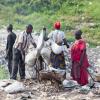
New research reveals a strong link between higher female education and lower fertility rates in sub-Saharan Africa. Educated women are driving a shift toward smaller families and even influencing less educated peers. This new forecasting model offers policymakers valuable insights into how women's education shapes population trends, aiding sustainable development efforts.
How does education affect women's desire to have children? In a new study, researchers from IIASA, the Max Planck Institute for Demographic Research (MPIDR), the University of Vienna and the Wittgenstein Centre for Demography and Global Human Capital, examined how women's education affects fertility rates in sub-Saharan Africa.
The researchers developed a new method for forecasting education-specific fertility trends. The study, published in the journal Proceedings of the National Academy of Sciences (PNAS), finds a strong empirical correlation between higher levels of female education and lower fertility rates.
“We developed a fertility forecasting model based on education levels that supports population planning and social development strategies. It gives a clear picture of fertility trends and enables more accurate predictions,” says IIASA alumna Saroja Adhikari, study lead author and postdoctoral researcher at MPIDR.
The specific innovation of this paper is to show that it is not only the education of the individual women that matters, but also the average education of the environment in which the women live. Higher average educational attainment is significantly correlated with lower ideal family size and lower actual fertility for women in each separate education category. This holds across a wide range of geographical and temporal contexts.
"Our study shows that educated women are leading the shift towards smaller family sizes in high-fertility communities, even influencing the choices of women with less education around them. This insight is now part of a new population forecasting model, giving policymakers better tools to understand how women’s education can shape future population trends and drive sustainable development across Africa," says IIASA alumnus Endale Kebede, a postdoctoral teaching and research associate at the University of Vienna and the Wittgenstein Centre, who is one of the study coauthors.
The research team used data from 138 demographic and health surveys conducted in 39 sub-Saharan African countries between 1986 and 2022. The model explicitly takes into account individual educational attainment and general educational background, without relying on subjective assumptions. The results are also highly relevant to climate change research, as forecasts based on education levels are increasingly used to assess societies' capacity to adapt to climate change.
Results reveal that education programs for women can play a key role in reducing fertility rates and thus helping to cope with rapid population growth in Africa. Improving women's education levels could therefore accelerate fertility decline and thus contribute to better population control and socio-economic development.
“While it's well known that educating women helps drive demographic change, this paper shows an added effect: women with less education often follow the behaviors and norms of more educated women in their community. The paper also uses this effect to create the first model for predicting fertility trends based on education levels,” emphasizes Wolfgang Lutz, study coauthor and IIASA Distinguished Emeritus Research Scholar.
Adhikari reiterates that their results could significantly contribute to designing family planning programs and policies.
Adapted from a press release prepared by the Max Planck Institute for Demographic Research.
Reference:
Adhikari, S., Kebede, E., Lutz, W. (2024) Forecasting Africa's Fertility Decline by Female Education Groups PNAS DOI: 10.1073/pnas.2320247121
News

02 September 2024
IIASA-led research lauded with Outstanding Article Award

15 April 2024
Collaborating to devise a strategy for organic waste management in Uganda

12 December 2023
